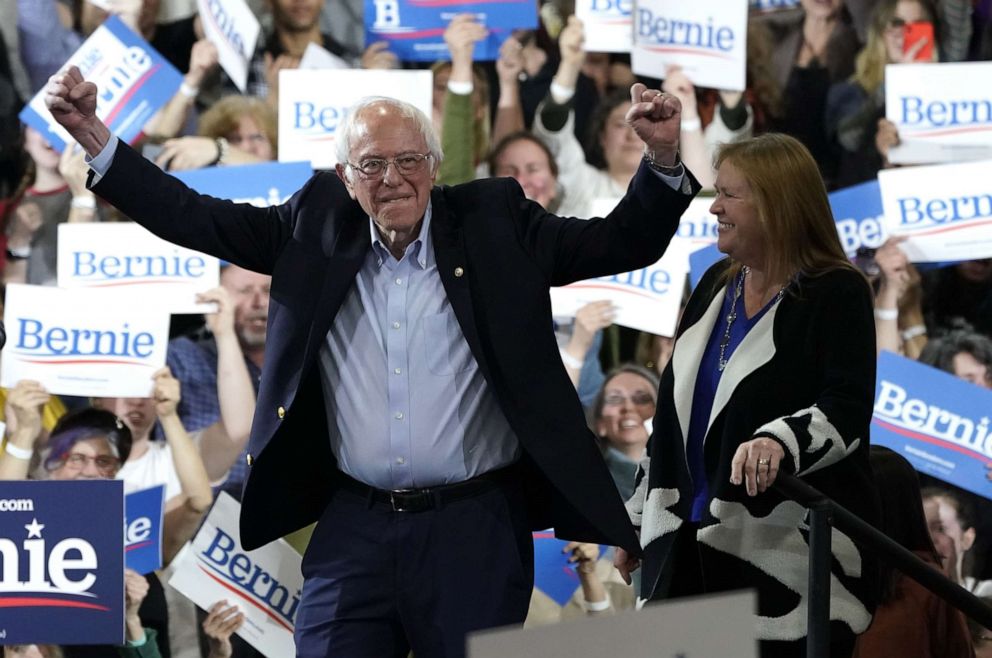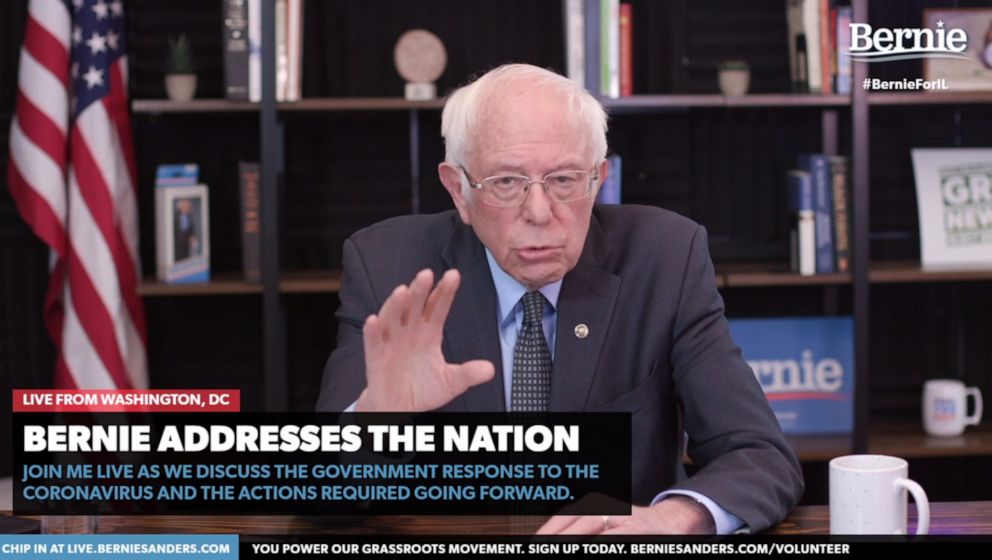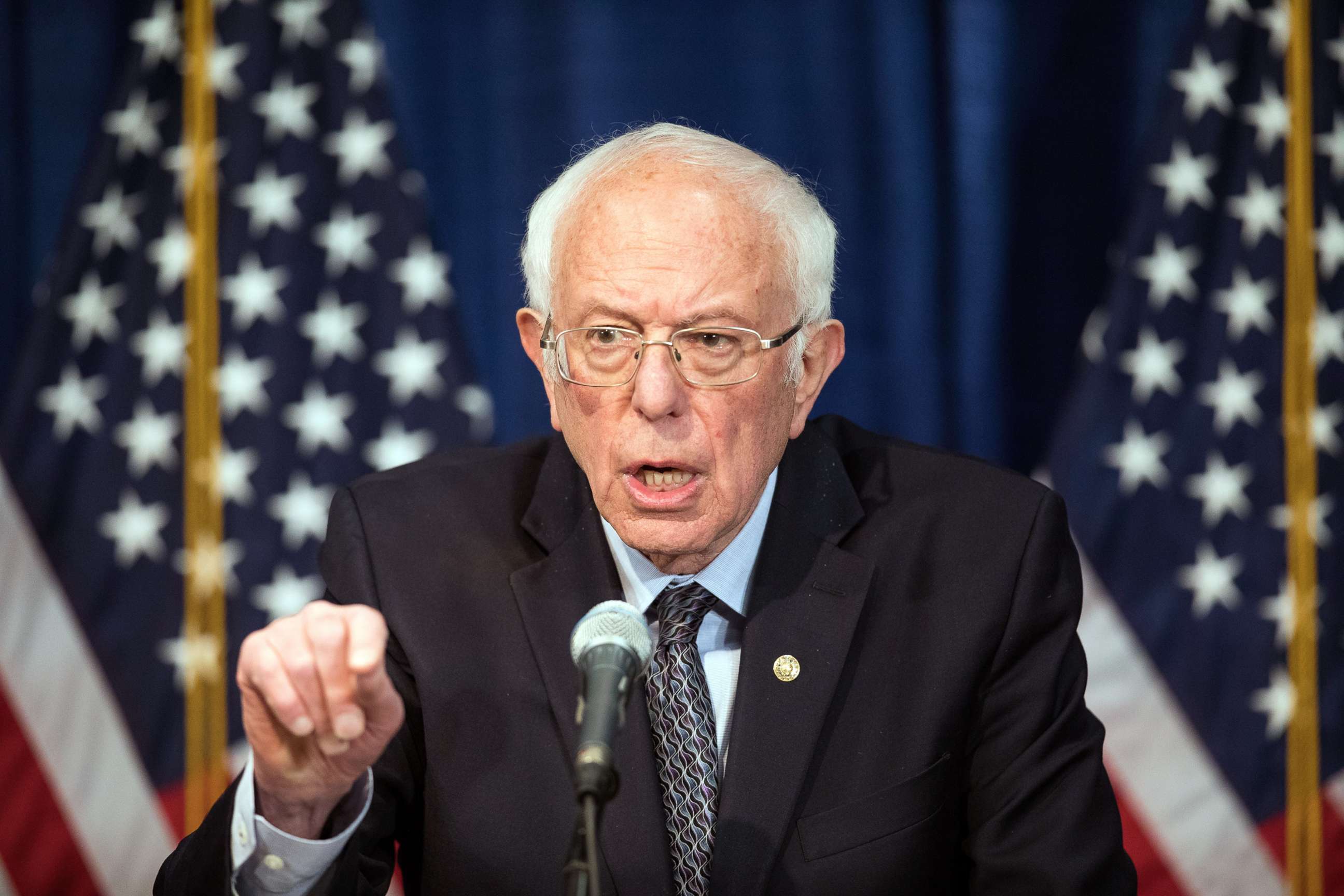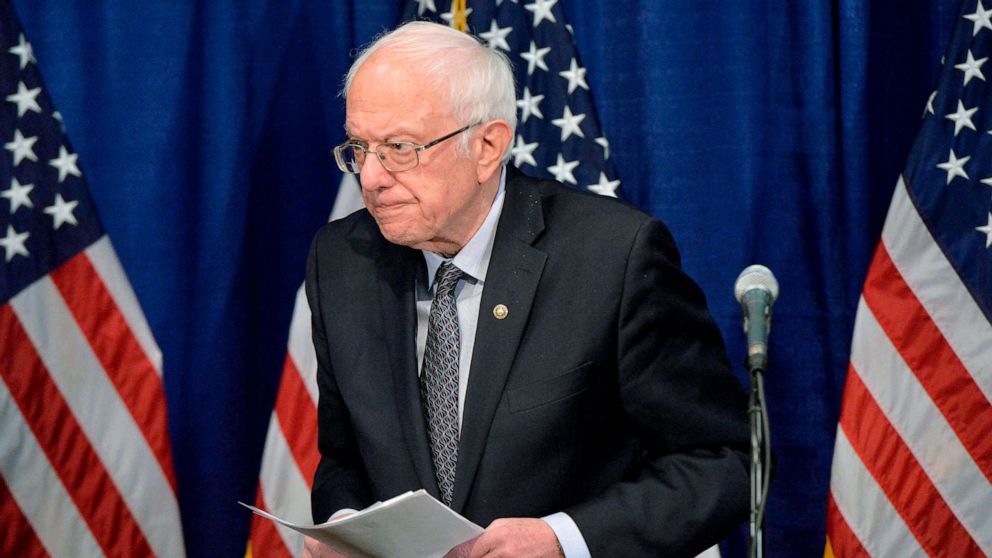Vermont Sen. Bernie Sanders suspends presidential bid
Vermont Sen. Bernie Sanders, a progressive standard-bearer whose campaigns for the Oval Office have helped usher in a left-leaning movement within segments of the Democratic party, has ended his 2020 bid
His departure from the race comes amid a coronavirus pandemic that has roiled the 2020 election cycle. Voters in exit polls across multiple states and on several primary nights indicated that they trusted former Vice President Joe Biden over the veteran senator to handle a crisis. For example, in telephone surveys--which were conducted in lieu of traditional exit polls due to the pandemic, respondents overwhelmingly picked Biden over Sanders as the candidate they trusted more to handle a crisis, by 73% to 20% in Florida, 63% to 32% in Illinois and 63% to 31% in preliminary results in Arizona.
Sanders' exit from the 2020 field all but assures that former Vice President Joe Biden will likely become the presumptive Democratic presidential nominee.
In a virtual address to supporters on Wednesday, Sanders thanked the more than 2 million people who donated to his campaign.
Sanders maintained that his campaign was winning the “ideological” and “generational” struggle by fighting for issues young people cared about.
“We are now some 300 delegates behind, Vice President Biden, and the path toward victory is virtually impossible, “ Sanders said. “So while we are winning the ideological battle and while we are winning the support of so many young people and working people throughout the country, I have concluded that this battle for the Democratic nomination will not be successful. And so today, I am announcing the suspension of my campaign.”
“I cannot in good conscience continue to mount a campaign that cannot win, and which would interfere with the important work required of all of us in this difficult hour,” Sanders added.
Sanders congratulated Biden and said he would work with the presumptive nominee to push his progressive agenda. Sanders pledged to support progressive candidates “at every level of government from Congress to the school board.” He also, hinted that he would remain on the ballot to snag delegates in an effort to effect change within the Democratic party.
"We must continue working to assemble, as many delegates as possible at the Democratic Convention, where we will be able to exert significant influence over the party platform and other functions," said Sanders.
“Let us go forward together. The struggle continues,” Sanders said as he closed his remarks.
Building the Bernie base
Over his decades-long career -- starting as mayor of Burlington, Vermont to the halls of congress -- the 78-year-old, veteran lawmaker has cultivated both an extensive and lauded congressional record and an avid following among devoted supporters who turned out en masse to his political rallies, wore merchandise touting "Feel the Bern" and he even inspired a video game.
Sanders was endorsed not only by New York Rep. Alexandria Ocasio-Cortez, but two other members of the so-called “Squad” of freshmen congresswomen of color: Minnesota Rep. Ilhan Omar and Michigan Rep. Rashida Tlaib. He was also endorsed by both leaders of the Congressional Progressive Caucus Rep. Pramila Jayapal of Washington State and Wisconsin Rep. Mark Pocan.

The Sanders campaign also boasted a laundry list of endorsements from progressive grassroots organizations and labor unions.
“It wasn’t until I heard of a man by the name of Bernie Sanders that I began to question, and assert, and recognize my inherent value as a human being that deserves health care, housing, education, and a living wage," Ocasio-Cortez once said during a rally.
Earlier this month, however Ocasio-Cortez, took to Instagram Live to react to a disappointing night’s primary results. She acknowledged how difficult the evening was for Sanders and for the progressive revolution he sought to inspire.
"You know, there’s no sugar coating it – tonight’s a tough night," she said. "Tonight’s a tough night for the movement overall."
The willingness of his supporters to shift loyalties and enthusiastically back the presumptive Democratic presidential nominee could, in part, hinge on signals Sanders sends on support. As the race tightened between the two final front-runners, Biden attempted to broaden his coalition and reach out to progressives who were Sanders' supporters as a general election matchup with President Donald Trump became more likely.
For his part, Sanders has been unwavering on the priorities he feels any future president should undertake.
Since the self-described Democratic socialist announced his 2020 presidential bid in February of 2019 his raison d'être throughout the campaign has been the support of the working class and policies centered around those efforts.
He is the chief proponent of Medicare for All-- his signature plan which would establish a single-payer system and eliminate private insurance. In June, Sanders unveiled a plan to cancel $1.6 trillion in student loan debt and to make all public colleges and trade schools tuition free and he is also a proponent of raising the federal minimum wage to $15 per hour.
While campaigning, the senator targeted Biden over the former vice president's 1993 vote in favor of the North American Free Trade Agreement, the 2000 vote to approve permanent normal trade relations with China and his 2003 vote in favor of the Iraq War. Sanders has argued that these positions could cost Biden votes in a general election with blue-collar workers and young voters.
Roots of a revolution
From its inception, his campaign aimed to build upon the organizing network of his 2016 presidential primary run against former Secretary of State Hillary Clinton. In that election cycle, however, he was able to eke out a surprising win against his opponent in the battleground state of Michigan --a move which helped further propel what would ultimately become a heated showdown between the two candidates for the nomination.
Ultimately, he lost that nomination amid claims that the Democratic establishment weighed in heavily for Clinton.
In a CBS interview with Sanders about his campaign launch, Sanders was asked what will be different about this campaign than his 2016 run.

"We're going to win," Sanders said, "We are gonna also launch what I think is unprecedented in modern American history and that is a grassroots movement."
And for a while, it looked as if he might do just that.
Sanders raised more than $46.5 million in February alone and since launching his campaign in 2019, he received more than 8.7 million individual contributions. Sanders has said it was more “than any campaign has received at this point in a presidential election in the history of our country.”
He fared well in the early states of Iowa and New Hampshire before his momentum slowed finishing a distant second to Biden in South Carolina -- a win largely attributed to support among black voters. Sanders lost 10 of 14 states to Biden, including all the southern contests.
And as Biden emerged from Super Tuesday in an apparent sweep, moderate Democrats--including many former presidential contenders such as Minnesota Sen. Amy Klobuchar, California Sen. Kamala Harris, New Jersey Sen. Cory Booker, former South Bend, Indiana Mayor Pete Buttigieg and entrepreneur Andrew Yang--coalesced behind the former vice president.
Sanders, whose strategy relied heavily on turnout, ultimately lost in Michigan a delegate-rich state he took in 2016. He did not win a single county in Florida and only one county in Illinois. In 2016, Sanders won nine counties in Florida and last cycle, Clinton narrowly eked out a win over Sanders, winning 23 of the state’s 102 counties along the state's edges, while Sanders ran up the score in the rural counties that made up the middle of the state.
In an appearance on ABC's The View earlier this month, Sanders pushed back when asked about his narrowing path to the nomination.
"Last I heard, people in a Democracy have a right to vote and have a right to vote for the agenda that they think can work for America," he said, adding, "In this unprecedented moment in American history, I think we need to have a very serious discussion about how we go forward."
"There is a path," Sanders, I-Vt., told Seth Meyers, when asked in an appearance on "Late Night" earlier this month about his chances to win the Democratic presidential nomination, before continuing.
"It is admittedly a narrow path."
As Sanders' losses mounted in the 2020 cycle, his ability to campaign in the traditional methods was further complicated amid the rapid spread of coronavirus and the need to nix mass gatherings such as rallies and rope lines, have staff telework and other changes.
Still, Sanders' virtual rallies and other digital events garnered millions of views.
Missed opportunities with some minority voters
Sanders' campaign, in latter contests, trailed in garnering support from black voters. Though, in places like Arizona, Sanders, who tended to appeal to younger voters, fared well with Hispanic voters--a group with a disproportionate share of the population under 45-- winning them by 45-27 percent over Biden.
The Sanders campaign was working to invigorate his efforts to reach African Americans and he had recently secured the endorsement of civil rights icon Rev. Jesse Jackson. The campaign also hired one of its surrogates, justice reform activist Phillip Agnew, to shore up organizing in black communities.
Sanders rolled out a policy proposal dubbed "The Reproductive Health Care and Justice for All" which aimed to tackle issues of access to reproductive health care and eliminate health disparities, namely black maternal mortality rates, which according to the Centers for Disease Control and Prevention, are three times higher for black women than for white women in the United States.
The Sanders campaign also overcame his own health crisis when he suffered a heart attack in Las Vegas in October. After uncertainty about if and at what pace he would be able to return to the campaign trail, Sanders returned to campaigning after a few weeks with a massive New York City rally announcing the endorsement of Ocasio-Cortez.
The path forward
Last month on ABC's "This Week", Sanders characterized a potential brokered convention for a less-popular candidate as the undermining of the people's will.
"I want you to think about it for a moment. If we go into Milwaukee, into the Democratic Convention with a lead. Having won many, many states, having won the people's vote -- and that is reversed at the convention. How do you think people all over this country are going to feel?" he asked.

"Do you think, really, that will give us the unity? You talked about unity, we need unity. If you reject the candidate that has the most votes from the people and you win it through superdelegates and the Democratic establishment and the corporate wing of the Democratic Party, do you think you're going to have the energy and the excitement of the grassroots movement to defeat Donald Trump? I honestly don't think you will," he added.
Ultimately, however, as Sanders conceded that he was too far behind in delegates to likely net the nomination, he vowed to supporters to work with Biden to "move our progressive ideas forward."
Sen. Elizabeth Warren of Massachusetts, the former presidential candidate who ran against corruption and pumped out more than 50 policy proposals during her own campaign, lauded Sanders' efforts on behalf of progressive policies.
"Thank you @BernieSanders, for fighting so relentlessly for America’s working families during this campaign. Your fight for progressive ideas moved the conversation and charted a path for candidates and activists that will change the course of our country and party," she tweeted.
For his part, Biden commended Sanders and his supporters, who he said have “changed the dialogue in America,” on issues like income inequality, universal health care, climate change and student loan debt. In a statement, Biden vowed that the movement Sanders started and has fought for will not end with his campaign, adopting the Vermont senator's campaign slogan “Not me, Us.”
"Bernie has done something rare in politics," Biden said. "He hasn’t just run a political campaign; he’s created a movement. And make no mistake about it, I believe it’s a movement that is as powerful today as it was yesterday. That’s a good thing for our nation and our future.”
ABC News' Adam Kelsey and Sasha Pezenik contributed to this report.
This report was featured in the Thursday, April 9, 2020, episode of “Start Here,” ABC News’ daily news podcast.
"Start Here" offers a straightforward look at the day's top stories in 20 minutes. Listen for free every weekday on Apple Podcasts, Google Podcasts, Spotify, the ABC News app or wherever you get your podcasts.




